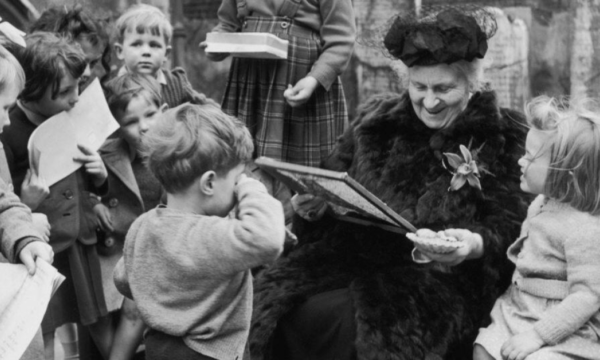“INFANTS & TODDLERS [0 THROUGH 3] PROGRAM DESCRIPTION: Montessori Academy Training Institute’s Montessori Infants & Toddlers Program is designed to prepare graduates to enter the dynamic field of Montessori education as skilled teachers of children aged 0-3 years old. The program developed at MATI is based upon the principle that developing a skilled educator requires engaging the head, the hands, and the heart. The Program involves both academic preparation and experiential learning through hands-on practice. An extensive field practicum allows students to acquire valuable working experience. Montessori principles of learning are imbedded in the curriculum delivery. Students are encouraged to explore, question and experiment in their quest to understand the philosophical foundations of the Montessori Method. Small class size and low instructor/student [maximum of 1:10] ratio helps foster a supportive environment in which critical thinking, creativity, and reflection are encouraged. The academic cycle begins on June 7, 2021 and ends along with the practicum phase on June 3, 2022. Academic Phase [283 hours] Early Childhood Course Overview [6.2.1] [24 hours] Students who do not hold a Montessori Early Childhood credential, must attend this overview course. This course is based on the Montessori philosophy and prepares the candidate to understand the curriculum of the 3-6 program. Topics include an introduction to Practical Life, Sensorial, Language, Math, Cultural and Sciences. Students are required to read two books: The Absorbent Mind, by Maria Montessori, and Her Life and Work, by E.M. Standing. Montessori Philosophy [6.1.5.1] [35 hours] – Dr. Maria Montessori’s philosophy and educational theories are examined in depth. A timeline of Dr. Montessori’s life and work is carefully studied. Topics include: The Absorbent Mind, Sensitive Periods, The Spiritual Embryo, The Montessori Triad, Planes of Development, and The Role of the Guide. Child Development [6.1.5.8] [45 hours] – During the course, the student will learn about the child’s amazing abilities to grow and develop on the first stage of life, 0-3 years. Many child theorists, such as Russeau, Erikson, Piaget, Kohlberg, Mahler, Maslow and others, will be discussed. This will allow the student to understand the physiological, cognitive, social-emotional and linguistic development of the child. Language Development [6.1.5.10] [16 hours] – The Infant & Toddler Language Development curriculum provides a scientific and well-planned order that takes the child from a receptive stage to a full-expressive phase; laying the foundation for later success in self-expression, reading, and writing. Environmental Design [6.1.5.3] [35 hours] Dr. Maria Montessori emphasizes the importance of the prepared environment. Toddler classrooms must provide a safe place where children can develop physically, cognitively, socially and spiritually. Aesthetics play a great role in the toddler class. All furnishings, manipulatives and purposeful activities are carefully design to support the growth of the child Montessori Pedagogy [6.1.5.2] [21 hours] Introduces strategies for nurturing and assisting the unfolding of the human personality. Presentations include the understanding of the physical, cognitive, social-emotional development of the child and how to prepare an environment to support Infant and Toddlers. Observation [6.1.5.5] [35 hours] This is one of the pillars of the Montessori methodology. Students will be trained in Observation skills to evaluate the development of Infants and Toddlers. Students must record and present at least 4 observations during the practicum year as part of their training. Program Leadership [6.1.5.7] [16 hours] All aspects of school leadership will be introduced. Students will receive training in classroom leadership, schedules, policies, and guidelines as we as adequate communication skills that support cultural diversity and equality. Presentations includes orientation sessions for parents, circle time, snacks and lunch, naps, outdoor activities, arrival/dismissal, and safety. Child, Family, and Community [6.1.5.8] [16 hours] This course provides an insight on how teachers can develop nurturing and supportive relationships with parents. A positive communication with the child’s parent will result in a greater partnership between family and school. Topics include effective communication skills, building trust with parents, sharing local resources as well as the importance of health and nutrition. Personal Growth and Development [6.1.5.6] [16 hours] This course is based on the Transformation of the Teacher to become the peaceful guides Dr. Montessori wrote about. Discussions and presentations provide the adult learner with techniques to grow spiritually, manage the balance between school and personal time while growing professionally as an educator. Music and Movement [6.1.5.10] [8 hours] This session will introduce the student to the Music curriculum at the Infant and Toddler level. Practicum Seminar [6.1.5.10] [16 hours] – The seminar will help the student discuss any concern/questions that he/she may have about their on-going practicum phase. The adult learner will have support available from training instructors and director. Practicum Phase 6.1.5.9 [Minimum 720 hours] Students begin their internship/practicum for a minimum no less than four hours a day, five days per week, for a full school year. Students have the opportunity to integrate the academic knowledge acquired with practical applications as they implement the Montessori Method to support the development of a group of 0-3 age children. Students spend an academic year under the direction of an AMS certified supervising teacher, in an approved Montessori school of their choice. A MATI field consultant will visit four times during the practicum phase to observe the student in the classroom and to provide feedback. Planning and implementing Montessori curriculum with children under the guidance of the supervising directress Preparing indoor and outdoor environments Observing, recording, planning, assessing and maintaining records Interacting with parents, staff and children Designing activities for infant/toddlers”
Infant & Toddler Montessori Guide Certification (0-3 years old)

